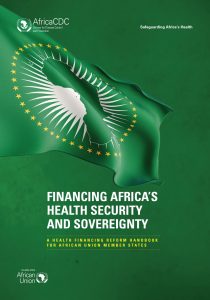The Africa Centres for Disease Control and Prevention (Africa CDC) has initiated a new programme to coordinate training in detection, diagnosis, and analysis of disease threats. The programme will better prepare the African continent for Ebola and other epidemics. On 16 and 17 November 2017, Africa CDC convened experts and leaders of successful training programmes to plan training for the next generation of epidemiologists, laboratorians and informatics personnel in Africa.
“The African Union Heads of State and Government set the three overriding agendas to meet and secure the health needs of citizens of the continent—the IHR Declaration, the Agenda 2063 and the African Health Strategy 2016-2030,” said Dr. John Nkengasong, the Director of the Africa Centres of Disease Control and Prevention. “Moving forward these agendas and to safeguard the continent from public health emergencies and crises, we need to develop a competent and skilled workforce with standardized, high quality and accredited training programmes.”
The African Field Epidemiology Network (AFENET) and Eastern Mediterranean Public Health Network (EMPHNET) currently operate training programmes for field epidemiology in most AU Member States. As part of its new programme, Africa CDC will work with these partners to expand the numbers of people trained, increase the quality of training and create more professional opportunities for graduates.
“A single event of Ebola Virus Disease Outbreak in West Africa in 2014 wiped out three years of World Bank funding that was planned for economic development of the three highly affected countries,” said Dr. Patrick Osewe, Lead Health Specialist of the World Bank. “We need to develop a critical mass of experts, including epidemiologists, for pandemic preparedness planning and response. Africa CDC should play a great role to meet these critical needs across Africa.”
The Africa CDC will henceforth provide stronger advocacy, oversight and coordination of the field epidemiology-training programme. In addition, using the field epidemiology programmes as a model, Africa CDC will work with the African Society of Laboratory Medicine, the Association of Public Health Laboratories and other partners to develop two new programmes: laboratory leadership and health informatics.
‘We are pleased to be part of the collaboration with Africa CDC. We offer our experience and expertise in field epidemiology and laboratory training and hope that we can be instrumental in strengthening the capacity of epidemiologists and laboratory workers in countries of North Africa,’ said Dr. Mohannad Al Nsour, Executive Director of the Eastern Mediterranean Public Health Network (EMPHNET).
‘Sub-Saharan Africa needs at least 6,000 field epidemiologists. However during the last decade only 1,300 were trained at the two year advanced Field Epidemiology and Laboratory Training programme level’, said Dr. Chima Ohuabunwo, the Executive Director of the African Field Epidemiology Network. “If we continue at current levels, we will need almost 50 years to meet the target. As such, we need to move faster with better advocacy, resource mobilization and coordination,’ he added.
Africa is at high risk of epidemics, because of rapid growth in its population, the increasing volume and velocity of population and commodities moving across borders and changes in climate and ecology. Recognizing that epidemics threaten peace, prosperity, and health, African Heads of State created Africa CDC. A major part of Africa CDC’s strategic plan involves developing a sufficient and competent workforce to prevent disease, identify threats early and respond rapidly and effectively to any emerging threats.






